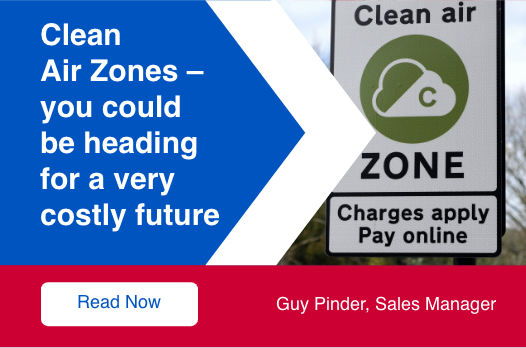Driving and caring for an HGV in winter
As the winter rolls in, so do dangerous conditions such as ice, snow, and reduced visibility, making for a hazardous driving experience. Those who operate heavy goods vehicles face extra challenges, so spending time preparing for driving and caring for an HGV in winter is essential.
-
Check the basics
Before starting any winter journey, check your:
- Tyres: Ensure they’re all in excellent condition with adequate tread depth and at the correct pressure – as cold weather can cause tyre pressure to drop. Consider using either winter tyres or all-season tyres with a good grip.
- Battery: Cold weather can drain a vehicle’s battery quicker. Test the battery’s voltage and ensure it’s fully charged. Replace it in good time if it’s nearing the end of its life.
- Lights: Visibility can be significantly reduced during winter. Check all your headlights, taillights, brake lights, and indicators to ensure they are working properly and are clean and clear of snow and ice.
- Windscreen and wipers: Ensure the windscreen isn’t cracked, and the wipers are in good condition. Use a winter-grade washer fluid that won’t freeze in low temperatures.
- Brakes: Test the brakes and ensure the pads, discs, and fluids are in top condition.
- Heating and defrosting systems: Check that the heating system works effectively and that the defrosters are working, as they’re critical for maintaining visibility.
-
Driving techniques
Driving an HGV in winter requires skill, patience, and a solid understanding of how to handle a large vehicle in adverse conditions:
- Reduce speed: Icy roads can reduce traction, making it harder to stop or control the vehicle. Always drive at a speed appropriate for the conditions, even if it’s well below the speed limit.
- Maintain safe distances: On icy, snowy or wet roads, increase the distance between you and the vehicle in front to account for longer stopping distances.
- Gentle manoeuvres: Make your steering, acceleration, and braking smooth and gentle, to keep control of your vehicle.
- Engine braking: Use engine braking to slow down the vehicle, especially when going down hills, to reduce the risk of skidding. However, avoid excessive use of this on slippery roads, as it can cause your wheels to lock.
- Anticipate road conditions: For example, look out for patches of black ice, especially in shaded areas, as these spots tend to freeze first and thaw last.
- Chains: In extreme conditions, using tyre chains can provide extra traction, but make sure you know how to install them properly.
-
Essential equipment
Carrying the right equipment can be a lifesaver in winter conditions:
- Snow chains: Even if you don’t use them very often, having them to hand can be crucial for navigating steep, icy roads.
- Shovel: A compact snow shovel is useful for digging out snow around tyres.
- De-icer and scraper: These are essential for quickly clearing ice from your windscreen, side windows and mirrors.
- Emergency kit: This should include a torch, reflective triangles, high-visibility clothing, and blankets.
- First-aid kit: Always have a well-stocked first-aid kit in case of emergencies.
- Tow rope: Useful for getting unstuck or helping others who might be in a difficult situation.
- Spare bulbs and fuses: Cold weather can increase the likelihood of electrical components failing.
-
Vehicle maintenance
All vehicles need on-going care to keep them in tip-top condition throughout the winter:
- Clean regularly: Salt and grit from the roads can cause corrosion. Regular washing, especially the underside, can help prevent rust.
- Monitor fluids: Make sure that all fluids—oil, coolant, brake fluid, and windscreen washer fluid—are topped up and are of the correct grade for winter use.
- Battery care: Check your battery terminals regularly for corrosion and clean them as needed. If the battery is struggling to hold a charge, replace it before it fails while you’re on the road.
- Air system maintenance: If your HGV is equipped with an air braking system, ensure that the air tanks are drained daily to prevent moisture building up, as this can freeze and cause brake failure.
- Check belts and hoses: Cold temperatures can make belts and hoses brittle, increasing the risk of cracks or breaks. Regular inspections can help spot potential issues before they cause breakdowns.
-
Planning and communication
Winter weather can be unpredictable, so planning your journey and maintaining communication are crucial:
- Route planning: Check your local weather forecasts and road conditions before starting your journey. Think about possible alternative routes in case of road closures or severe weather.
- Timing: Allow extra time for your journey to account for slower driving speeds and potential delays.
- Keep up-to-date: Use GPS or an app that provides real-time traffic and weather updates.
- Communication: Keep your team informed of your progress and any changes in your route or schedule. In the event of an emergency, having a reliable way to communicate is essential.
-
Prepare for emergencies
If you get caught in an emergency, being prepared can make all the difference:
- Know your limits: If the weather becomes too severe, it’s safer to pull over and wait for conditions to improve rather than risk being involved in an accident.
- Stay with the vehicle: If you become stranded, it’s usually safer to stay with your vehicle rather than trying to walk for help, especially in blizzard conditions.
- Use hazard warning lights: When stopped at the side of the road, always use your hazard warning lights to alert other drivers of your position.
- Conserve fuel: In a prolonged emergency, conserve fuel by only running the engine intermittently to stay warm.
Conclusion
Driving and caring for an HGV in winter poses significant challenges. However, with the right approach – careful preparation, cautious driving, and ongoing maintenance – you can minimise the risks and ensure that your drivers, vehicles and cargo reach their destinations safely.
Keith Hayden, Sales Manager, Dawsondirect
Recent News
- How to Finance a Used Truck or Trailer in the UK: Options Explained
- Euro VI and Clean Air Zones: What to Consider When Buying a Used Truck in the UK
- Used HGV Buying Mistakes That Cost UK Operators Thousands (And How to Avoid Them)
- Is a Used Truck a Better Investment Than New? A UK Fleet Cost Comparison
- Is Now a Good Time to Buy a Used Truck in the UK? Market Trends and Buyer Advice
- Curtainsider vs Box vs Refrigerated: How to Choose the Right Used Trailer for Your Operation
- Used Truck Inspection Checklist: How UK Fleet Buyers Can Avoid Costly Mistakes
- What Mileage Is Too High for a Used HGV? A UK Buyer’s Guide
- How to Buy a Reliable Used Trailer in the UK: Expert Advice for Fleet Buyers
- The True Cost of Buying a Used Truck: What UK Buyers Often Overlook
- Top Things to Check When Buying Used Trailers: A Checklist for Logistics Operators
- 5 Common Mistakes Haulage Companies Make When Upgrading Their Fleet — and How to Avoid Them
- How to Spot a Reliable Used Trailer or Truck: Expert Tips from the Yard
- Navigating the Used Commercial Vehicle Market: A Strategic Guide for UK Operators
- Why the Demand for Used Trucks Is Rising in 2025
- Get to Know… Luke Thorsen
- Trends in the UK used truck market
- Get to Know… Guy Pinder
- Get to Know… Emma Denton
- Get to Know… Gareth Williams
- Choosing the right used truck for your business needs
- How important are truck drivers and good quality trucks to the UK economy?
- Driving and caring for an HGV in winter
- Top 10 fuel efficiency tips for HGVs
- Clean Air Zones – you could be heading for a very costly future
- UK Operator Licences – an essential guide
- Excellent customer service comes as standard with Dawsondirect
- Get to Know… Stuart Gray, our new General Manager
- Turbocharge your career in used truck and trailer sales!
- What to look for when buying a used truck
- Dawsondirect – your first choice for quality used trucks and trailers
- ‘Interesting’ time in the used truck and trailer market
- Used truck and trailer live auctions are back!
- Warehouse on Wheels satisfies strong demand at Summer events
- Get to Know… James Hunter, Head of Remarketing
- Perfect storm poses new challenges for stallwart in used truck sales
- Multi-million-pound investments in fleet renewal and refresh
- New Dawsongroup South West supersite opens for business
- Don’t get caught out by London’s Direct Vision Standard!




